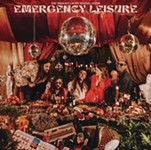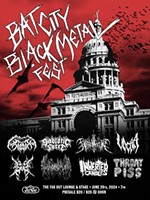Shoot Out the Lights
Nakedly optimistic about the Bright Light Social Hour
By Margaret Moser, Fri., Feb. 11, 2011

Several hundred yards from where the Mississippi River borders Baton Rouge's industrial section, the Spanish Moon rises on a Friday night. Outside the venue, through the chain-link-fenced parking triangle, the white lights outlining the Mississippi Bridge glitter on the dark waters rolling southward to New Orleans and the Gulf of Mexico. The river has lured humankind from time immemorial, its power genuinely awesome, wild, unstoppable.
In front of the stubby, two-story, old red brick building, the Bright Light Social Hour unloads its gear. Tonight is the last show of the quartet's first major tour, a two-week stint built around shows in Florida at a Miami festival, with stops in Texas and Alabama on the way, and in Georgia and Louisiana returning. Two weeks is twice as long as the group's been out on the road before. That makes them babes in the swamps.
Back at home in Austin, after three EPs and a well-organized voting campaign in Dell Lounge's Sound & the Jury competition, the Bright Light Social Hour won a slot at the Austin City Limits Music Festival in 2009. Six months later, they walked off with Best Indie Band at the Austin Music Awards, and when the group's release show for its eponymous debut sold out Antone's last fall, they finessed rave reviews (see "Texas Platters," Dec. 24, 2010) and year-end accolades from radio, print, and Web media, backed up by an avid following that landed them a headlining gig at the Parish on New Year's Eve. Right now, their South by Southwest 2011 dance card includes the prestigious NPR showcase.
Here in Baton Rouge, the townies haven't yet blinked.
More Songs About ...
"Hello, we're gonna do a song about fucking!"
Bassist Jack O'Brien, arguably the band's most recognizable member for his handlebar mustache, doesn't introduce "Detroit" by title, but as the foursome slides into three-part falsetto harmony, crooning "I need your love," he doesn't have to.
The Bright Light Social Hour had the audience at "Hello."
They're a handsome bunch, jazzed to be playing this Friday night in January, though it's not a big audience and this isn't an auspicious gig. They weren't even listed on the website as opening for Austin power combo Megafauna, with Baton Rouge natives Monsters Will sandwiched in between. The 60-odd college-age clubgoers respond to O'Brien's cheeky intro and the band's ensuing magnetic beat with the whoops and hollers of a Louisiana party crowd. And Bright Light Social Hour owns the moment. They have the songs and the sound.
Mapping modern rock requires as much intuition and influence as it does style and substance. The Bright Light Social Hour galvanizes with the right combination of songs and sequencing – the delivery, the track lengths. Nine indie dance and bluesy electric jam tracks dripping with white funk. Think MGMT for Southern hippies, the euphoria and segues. Nine's an odd number, but there's not a clinker in the lot, and taken as a whole – Woodstock-leaning LP art included – the group's full-length bow rightly turns heads.
"Shanty" propels itself with the elastic kick drum of club music, while "Bare Hands Bare Feet" resounds like a 1980s stadium anthem demanding the audience chant its title. The dreamy instrumentals "Men of the Sea," "Men of the Earth," and shifting "Rhubarb Jam" drift alongside the lyrically simple "La Piedra de la Iguana" and rhythmically smart "Garden of the Gods."
"This song's on the new record. It's about fucking."
Jo Mirasole's kinetic drumsticks sucking the air from the high hat and O'Brien's muscular bass confront Curtis Roush's chunky guitar and A.J. Vincent's dangerous keyboard swell on "Back and Forth." No one backs down. BLSH takes cues from the dance rock of LCD Soundsystem and Daft Punk, but the album as a whole suggests the band stands on the cusp of a musical cycle about to reclaim indie bounce from the staged take over of Lady Gaga. Even then, considering BLSH's trio of lead singers, what comes to mind is the Band's Richard Manuel whenever Roush scales a note.
Maybe the smartest move the Bright Light Social Hour made was to hand over the album's reins to musician/engineer/producer/mix master Danny Reisch, whose short list includes White Denim, Suzanna Choffel, What Made Milwaukee Famous, and the Black Angels, and whose equally sparkling résumé includes mixing for the ABC festivals – Austin City Limits, Bonnaroo, and Coachella – plus SXSW and Fun Fun Fun Fest. Reisch supplied the Midas touch.
The disc's aural dynamic is matched by a hair-flailing, foot-stomping, drumstick-twirling, guitar-crunching stage show. Bass and drums pound the Spanish Moon's irregular layout, guitar and keyboards swirling in the drifts of cigarette smoke and lifting the songs up into the hazy blackness and voodoo ether. The Bright Light Social Hour is transcending, but the audience is oblivious to the tribal significance. They're just happy to dance.
The Townie Effect
Way back in the Dark Ages of Austin music, the 1980s, the phrase "born in Austin" was an anomaly, seldom trotted out, and usually applied to Eric Johnson when it was used. Except for drummer Jo Mirasole, whose family moved here from California when he was in middle school, all members of the Bright Light Social Hour are born and raised in Austin.
Austin's 1980s reaped its first generation of musicians raised in nightclubs – Charlie Sexton and Ian Moore famously slept on chairs in clubs as kids and headlined stages the next decade. As new generations of players grew up and entered the musical work force, a new wrinkle shifted the local scene: Music camps and high school bands began turning out a better-informed breed of musician. Some, like Warren Hood, Django Walker, and Colin Gilmore, waded out of the gene pool, but they're every bit as serious as Sahara Smith, Speak, and Mother Falcon.
At 27, Bright Light Social Hour bandleader Curtis Roush would like to clarify that he was raised in Round Rock, graduated from Round Rock High School, and is proud of that distinction. Suburbs and bedroom communities can offer remarkably open connections to music for teenagers; Round Rock gave the bespectacled Roush an eagle-eye view of the live music capital.
"When you're 12 and you can see Eric Johnson play, that's it," he marveled. "In my developing musician days, when I was focused on how fast I could play guitar, so many of my guitar heroes – Eric, Stevie Ray Vaughan, Monte Montgomery – were based out of Austin. Having them right here added to the challenge, the incentive of wanting to play. It ups your game."
Instead of pursuing sports and partying in high school, Roush sat around with friends and played guitar. That paid off at Southwestern University in Georgetown when, around 2004, he and roommate Thomas Choate decided to form the Bright Light Social Hour. In need of players, Roush sent an e-mail blast campuswide.
"I knew who [Jack O'Brien] was," explains the guitarist. "He had long hair and lip piercings, and I'd see him walking across campus. When Thomas and I got the e-mail response from him, somehow, we knew it was him. Things worked out instantly with Jack. To this day, it's rare for arguments to break out between us. We see eye to eye on most things."
"Blues is what I bring to the band," offers O'Brien, 25, his mustache not doing the talking this time but the bassist's sly, dark-eyed smile coming in loud and clear. "My dad was a rock organist from Boston and a huge, huge blues fan. He loved the blues scene here in Austin and always wanted to get out of the house. As soon as I was 8, he began taking me to Nuno's and Antone's all the time. I saw Guy Forsyth and Bonnie Raitt there, really great shows. He exposed me to all that at a really young age. I still love the blues scene in this town."
Mirasole, 22, couldn't care less about blues, guitar-slingers, and Austin's past. He came to the band via a Craigslist ad in 2006, right off the drum line of the Round Rock High School marching band. The elfin beat keeper brings to the table a broad spectrum of interests informed by a jazz drummer father. Mirasole has as little use for Vaughan worship as he does for 1990s indie acts.
"Electronic music has always had a hard time in Austin," he enthuses, "but the DJs seem to do better than their band counterparts. Wolfgang Gartner is huge now, one of the best producers in the world right now, top tier. Francis Prève does synth program work for Moog and Roland and teaches at [Austin Community College]. I love Mother Falcon. And Neon Indian and Vega. Octopus Project gives me hope."
Roush, O'Brien, and Mirasole worked the tough nucleus of Bright Light Social Hour, with the middle man initially working the keyboards. A.J. Vincent, two years younger than O'Brien at Westlake High School, wondered about this arrangement, knowing his friend to be an accomplished bassist, so O'Brien encouraged Vincent to bring his good looks and keyboard skills to the band. At 23, he's a poster child for music education in public schools.
"I was a little dude when I started playing – 5," explains Vincent. "I was going to Barton Creek Elementary and got a flier offering piano lessons. I took it home to my parents – I can still picture where they were sitting – and told them I wanted to take piano lessons. They were like, 'Really?' After that school year finished, I continued lessons through UT's master class students. I took lessons until my sophomore year in high school."
Vincent's story is unique among his bandmates' not because he joined last, but because he later attended the Austin School of Music, where he worked with musician, teacher, and local teen music advocate James Mays, now with the Band Aid School of Music. In doing so, Vincent picked up nuances of the craft and of the business and packed them into his experience kit.
"The reason I can hit those notes at the end of 'Detroit' is because of what James Mays taught me about singing," nods Vincent. "He showed me how to really feel it, even if it's not perfect. He explained to me what a good performance was. Not just singing, but performing."
Encore
The Bright Light Social Hour isn't exactly fending off wolves at the door. All those critical huzzahs don't guarantee warm bodies at shows, and no labels have begun an old-school bidding war. At least the band doesn't scramble to people its performances around Austin.
They do have an act to follow, however – their own. O'Brien guesses this process will take another 18 or so months "to hone new songs down, get them written, and road-test them."
"It's been on my mind, having to follow this up," admits Vincent, more philosophical about the prospect. "The first record we wrote hoping people would hear. This next one, we know people will be listening for [improvement]. It's harder – you don't want to think about people listening that way. It's a strange psychological notion I had to get over that the songs now being written will be heard by hundreds of people."
For Roush, it's the proverbial dream come true.
"The most exciting part is that we found a lot of our stylistic preferences while recording the last record," he waves. "We're excited to keep utilizing these strategies and ways of looking at music we were only discovering while making this record. My hope is the next record will be more confident, a better version of the first record."
Which will hopefully include the classic rock touches the Bright Light Social Hour are so adept at infusing their music with, like the quirky, Devo-esque opening to the funky "Shanty."
"Who's Devo?" asks Vincent.










